How To Stop A Cat From Crying At Night?
If your cat’s meowing disturbs you frequently at night, don’t worry – you’re not alone. Many cat owners experience this issue and often wonder why their cats become noisy at night and how to solve it.
By: Elizabeth Rikas
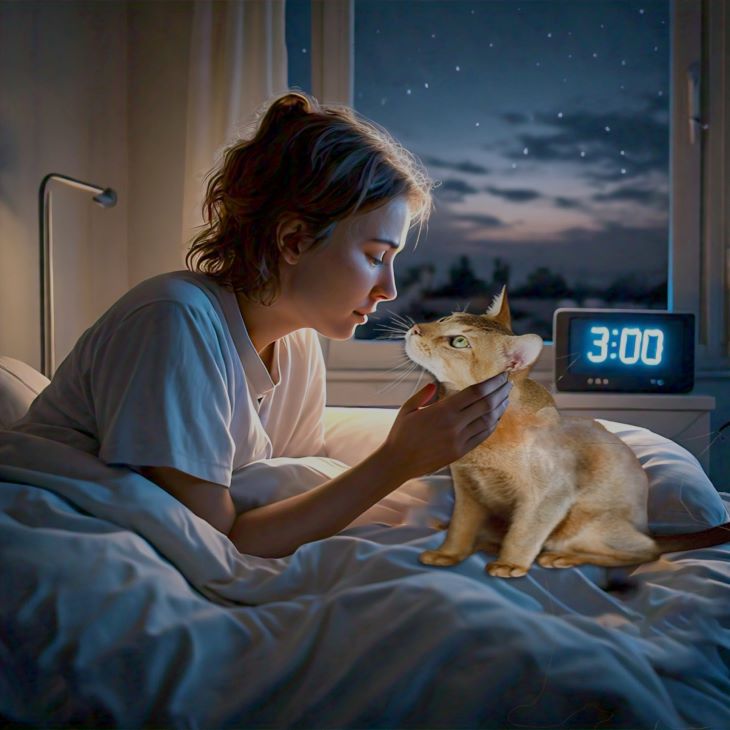
The information in this article is intended to educate cat parents and is not a substitute for veterinary guidance. In case of any concerns about your cat’s health, please talk with your veterinarian.
Understanding what causes your cat’s night time cries is the key to resolving this common issue. Whether it is due to some medical issue, boredom, or seeking attention, the first step towards a peaceful sleep is identifying what causes that noise.
Click to leran about: Whisker Fatigue In Cats
This article provides an overview of common reasons for yowling at night, along with some effective tips on how to stop it.
Why Do Cats Meow At Night?
Understanding why cats meow at night is crucial for effectively addressing this behavior and its underlying causes. This article breaks down some common reasons behind those night cries from your cat.
Health Issues
Meowing is often associated with simple requests for food or attention. But sometimes these pleading sounds may indicate something more severe such as health problems. Immediate consultation with a veterinary doctor becomes necessary if sudden nighttime cries occur.
Some common health problems in cats include:
Pain And Discomfort
Just like us, cats feel pain. Arthritis, dental disease, urinary tract infections, and other conditions can cause discomfort that worsens at night when few activities are available. The cats may resort to making sounds, to seek relief or indicate that something is wrong.
Hyperthyroidism
An overactive thyroid gland has various symptoms in cats including restlessness, anxiety, and increased meows. Sleep patterns get disrupted due to the hormonal imbalances associated with hyperthyroidism which also cause cats to cry at night.
Other Medical Conditions
Kidney Disease, Urinary Tract Infections, Diabetes, and even parasites among others could aggravate pain or discomfort potentially leading to more night-time meowing than usual.
Age
As cats age, meowing or crying at night increases due to various factors. This may result from cognitive decline causing confusion and disorientation, or sensory decline making them feel more insecure in the dark, leading to crying and meowing.
The reasons for aged cats crying at night are discussed in detail below:
Decline Of Cognitive Abilities
Like Alzheimer’s disease in humans, elderly cats also get affected by age-related cognitive dysfunction syndrome sometimes. They may become confused and disoriented at quiet times, especially during midnight when their normal routines are disrupted leading to anxiety. When their anxiety gets out of control they start meowing. It is their way of expressing distress.
Decreased Sensory Function
With age, cats’ senses such as vision and hearing might deteriorate. This may make them feel less protected or uncomfortable, particularly in dim light conditions. They might meow to call out for their owners or express their unease.
Boredom, Stress And Anxiety
A cat may meow at night due to boredom, stress, and anxiety.
Boredom
Cats are naturally active and curious. If they do not receive enough mental and physical stimulation throughout the day, they may get anxious and loud in the evenings. To reduce the noise, ensure the cats have toys, engage in interactive playtime, and provide environmental enrichment.
Stress
Their environment or schedule should not be altered because of their sensitivity. It will take them some time to adapt to new situations that they do not understand. This is because they lack the cognitive ability to understand certain things as we do, making it difficult for them to accept what is happening around them, or inside their bodies, especially if it affects their health negatively.
Anxiety
Some cats are naturally more anxious than others which often leads them to excessive meows during the night. Separation anxiety, fear of darkness, or even underlying medical conditions could all contribute to anxiety.
Seeking Attention
Cats are social creatures that create strong connections with people. They seek interaction and love and aren’t afraid to express it. If a cat feels they are not receiving enough quality time from their human during the day, may begin meowing at night to seek attention.
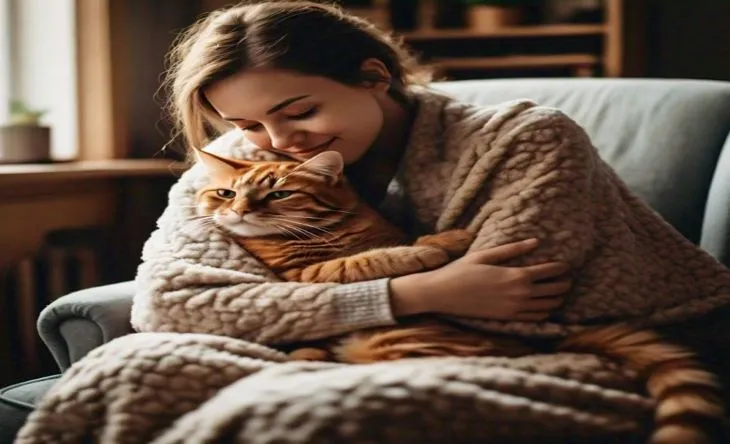
This can be especially true if someone is busy working long hours while accustomed to more frequent socializing at other times.
Imagine yourself as a playful kitty who loves to snuggle with your owner. However, lately, he or she has been coming home late, leaving you alone for many hours each evening. When do you anticipate you might begin making noise to ensure you get what you want? Of course, at night.
Food
Cats have an inherent need for food due to their natural hunting instincts, and for relieving boredom. Even if someone feeds them before bedtime, if they suspect any delicious tidbits being held back somewhere in the house, this behavior might still occur. The situation worsens further when these furry friends’ meals lack consistency or are provided only once daily in the evenings, as empty dishes now call out loudly via nighttime meowing until they are refilled.
Changes In Routine Or Location
Cats like routine and are creatures of habit, which can make them feel safe. Even the smallest change such as feeding time could be stressful for a cat—they may not be able to handle it well emotionally.
Adding new furniture pieces one after another in your living room would drive those poor little animals crazy too!
Moreover, if renovations were happening while you had guests over who brought along their pets… The list goes on, but essentially, any disruption to their peace at home might lead to nighttime meows. So don’t forget about giving extra snuggles during these periods!
Litter Box Problems
Cats are notoriously clean animals and are very particular about their litter box. If their litter box is not regularly cleaned, placed in a noisy or high-traffic area, or they don’t like the kind of litter you are using, it can cause issues.
They may meow at night to show their dissatisfaction.
Related Read: How to stop cats from peeing on carpet?
Heat Cycle
Female cats that haven’t been operated on to prevent them from getting pregnant experience a heat cycle once every few weeks. During these times their hormones change drastically which causes diverse behavior such as excessive vocalization. They tend to meow loudly and persistently particularly at night when looking for a partner.
This can be quite disruptive, and the only permanent solution is to have your cat spayed.
How To Stop A Cat From Crying At Night
Below are the few effective and tested tips to prevent your cat from meowing at night:
Rule Out Medical Issues
The first and foremost thing to do is to rule out any medical issues causing your cat to cry at night. The following will help:
Regular Vet Checkups
Should your cat’s nighttime meowing become sudden or excessive, it is advisable to schedule a check-up with your veterinarian. They can rule out any underlying medical conditions like pain, hyperthyroidism, or cognitive decline.
Observe For Signs
Watch for other symptoms like changes in appetite, litter box habits, or activity levels, as these could also indicate a health problem.
Adjust Feeding Schedule
Adjusting meal times may have significant effect on your cat ‘s behavior.

Late-Night Meal
Feed your cat a small meal right before bedtime. This can help satiate them and reduce the chances of them waking you up for food.
Automatic Feeder
If your cat tends to wake up hungry, consider using an automatic feeder to dispense small meals during the night.
Playtime Before Bed
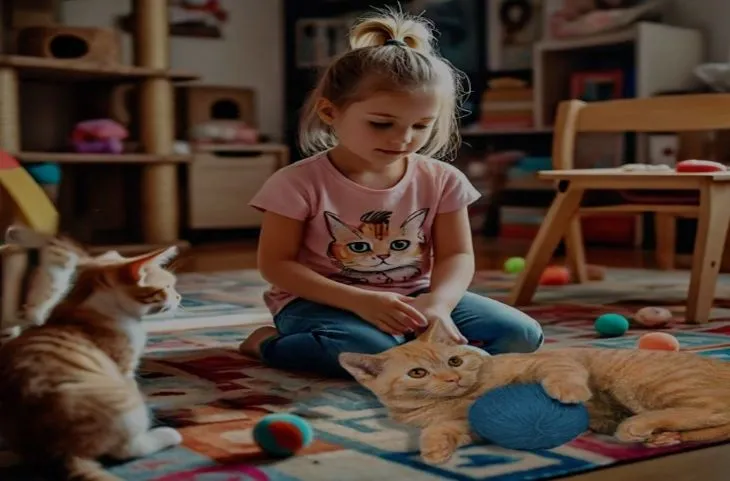
Playtime before bed is important to tire out your cat and encourage a restful night.
Interactive Play
Before bedtime, engage your cat in active play sessions using toys like fishing rods or laser pointers. This helps them burn off excess energy and tire them out.
Puzzle Toys
Provide puzzle feeders or food-dispensing toys to keep them mentally stimulated and occupied in the evening.
Good Environment
Creating a good environment is essential for preventing night time cries in cats and encourage relaxation and contentment.
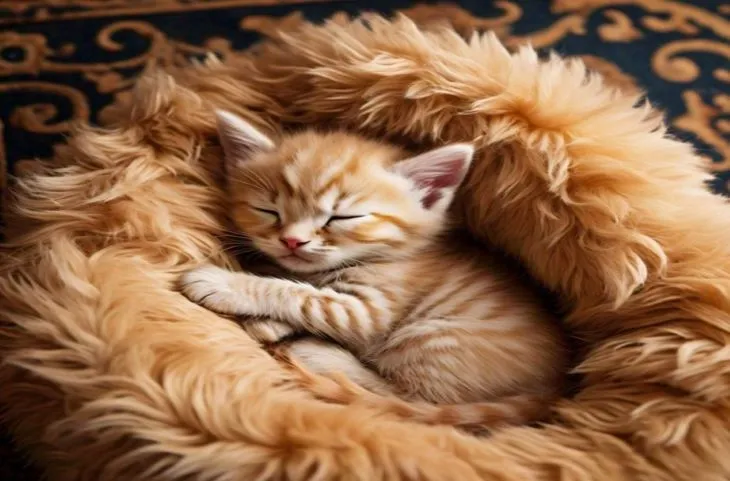
Comfortable Bed
Ensure your cat has a comfortable and cozy bed in a quiet location where they feel safe and secure.
Nightlight
If your cat seems disoriented in the dark, a dim nightlight can help them navigate their surroundings and feel more at ease.
Quiet Space
Minimize loud noises or disturbances that might wake up or startle your cat.
Litter Box Hygiene
Maintaining proper litter box hygiene is crucial for preventing nigh time crying in cats.
Regular Cleaning
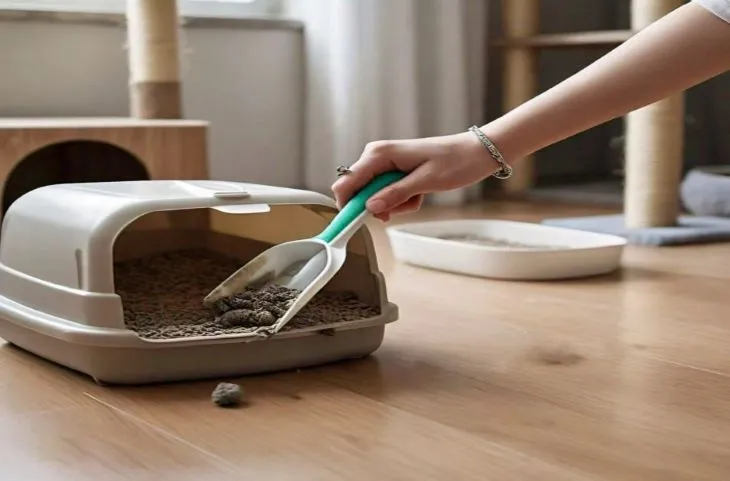
Scoop the litter box at least once a day, preferably twice, and change the litter completely every week or two.
Multiple Boxes
If you have multiple cats, have one more litter box than the number of cats in your household.
Placement
Place the litter box in a quiet, easily accessible location, away from food and water.
Consistent Routine
Cats thrive on routine. Maintain a consistent schedule for feeding, playtime, and bedtime to help them feel secure and predict when things will happen.
Behavioral Training
Investing time in behavioral training can effectively reduce nighttime crying in cats.
Ignore Attention-Seeking Meows
If you’re sure your cat is meowing for attention, resist the urge to get up and interact with them. This will teach them that meowing won’t get them what they want.
Reward Quiet Behavior
When your cat is quiet, reward them with pets, praise, or a small treat. This reinforces positive behavior.
Soothing Sounds
To help your cat settle down for a peaceful night’s sleep, try incorporating soothing sounds into your cats’ nighttime routine.
White Noise
Use a white noise machine, fan, or calming music to drown out any noises that might disturb your cat’s sleep.
Calming Sounds
Some apps and devices offer specifically designed calming sounds for cats. Try using these apps to create a calming atmosphere.
Calming Products
Explore using calming products that can provide a sense of comfort and relaxation, promoting a tranquil sleep environment for your feline friend.
Pheromone Diffusers Or Sprays
Synthetic pheromones can mimic a cat’s natural calming pheromones, helping to reduce anxiety and stress.
Frequently Asked Questions
Conclusion
Nighttime meowing can be a frustrating disruption. It is important to remember that your cat is trying to communicate a need.
By comprehending the diverse reasons behind this behavior, ranging from medical issues to mere boredom or a need for attention, you can effectively address the problem, and create a more peaceful environment for you and your feline friend.
